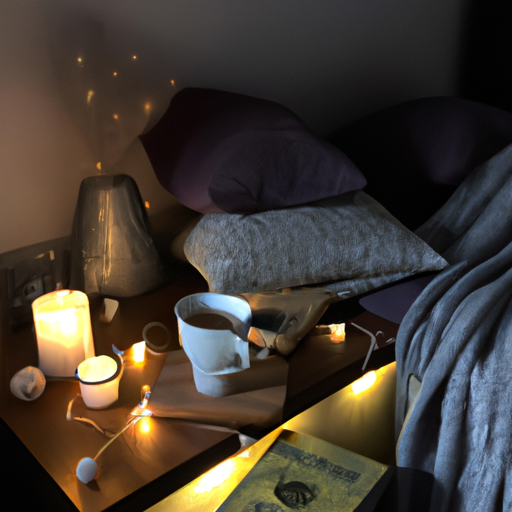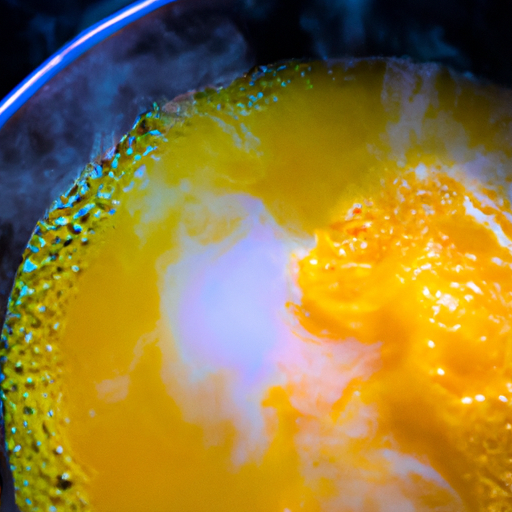As someone who has struggled with getting enough quality sleep, I am always on the lookout for natural remedies that can help me drift off into a peaceful slumber.
Recently, I have been hearing more and more about the potential sleep benefits of ginger tea. So, I decided to do some research to find out if there is any scientific evidence to support this claim.
In this article, I will explore:
- The history of ginger tea as a sleep aid
- The science behind its potential sleep benefits
- How to make ginger tea for maximum sleep benefits
I will also discuss:
- Other natural remedies for sleep
- Lifestyle changes that can improve sleep
- The importance of quality sleep
- Potential side effects and precautions to take when using ginger tea
Finally, I will offer some tips for incorporating ginger tea into your sleep routine.
Key Takeaways
- Ginger tea contains compounds with anti-inflammatory and antioxidant properties that reduce inflammation and oxidative stress, both of which disrupt sleep.
- Drinking warm ginger tea before bed can help relax the body and ease tension in muscles, potentially improving sleep quality.
- Lifestyle changes such as creating a peaceful sleep environment, establishing a consistent sleep routine, and limiting exposure to screens before bed can also improve sleep.
- It is important to consume ginger tea in moderation and consult with a healthcare provider before using it, as consuming too much ginger can lead to adverse side effects and it may interact with certain medications or cause allergic reactions.
The History of Ginger Tea as a Sleep Aid
Want to know the fascinating history of how ginger tea became a popular sleep aid? Let’s dive in!
Ginger tea has been a cultural staple for centuries, with roots in ancient Chinese, Indian, and Arabic cultures. Traditionally, ginger tea has been used for its medicinal properties, including soothing upset stomachs, promoting digestion, and reducing inflammation. But its use as a sleep aid is also deeply rooted in cultural significance.
In many cultures, ginger is believed to have warming properties that help promote relaxation and sleep. For instance, in India, ginger tea is often consumed before bed to help calm the mind and body, while in China, ginger is considered a yang food that can help balance the body’s energy and promote restful sleep.
With such a rich cultural history, it’s no wonder that ginger tea has become a popular sleep aid around the world. But what does science have to say about ginger’s potential sleep benefits?
The Science Behind Ginger’s Potential Sleep Benefits
Exploring the potential sleep benefits of ginger involves understanding the science behind it. Ginger contains compounds like gingerols and shgaols which have anti-inflammatory and antioxidant properties. These compounds can help reduce inflammation and oxidative stress in the body, which are both known to disrupt sleep.
Moreover, ginger tea may also help alleviate anxiety and improve digestion, both of which can be factors that contribute to poor sleep. Ginger has been shown to have anxiolytic effects, meaning it can reduce feelings of anxiety and promote relaxation.
Additionally, ginger can help soothe the digestive system, which can lead to less discomfort and better sleep. By addressing these underlying factors, ginger tea may be able to promote better sleep quality and duration.
To maximize the sleep benefits of ginger tea, it’s important to know how to make it properly.
How to Make Ginger Tea for Maximum Sleep Benefits
To get the most out of your ginger tea for a good night’s rest, try steeping sliced ginger root in hot water for at least 10 minutes and adding honey or lemon for taste. Ginger tea has a calming effect on the body, making it an ideal bedtime drink.
However, the benefits of ginger tea extend beyond sleep. Ginger is known for its anti-inflammatory properties and can help alleviate muscle pain and soreness, making it a great post-workout drink. It’s also rich in antioxidants and can help boost the immune system.
There are different ways to prepare ginger tea for flavor variety. You can add cinnamon, cardamom, or mint leaves for added flavor. You can also try using different types of honey, such as manuka honey, for added health benefits. Experiment with different combinations to find your favorite flavor.
In the next section, we’ll explore other natural remedies for sleep that you can try in addition to ginger tea.
Other Natural Remedies for Sleep
If you’re having trouble falling asleep, there are several natural remedies that can help improve your sleep quality. One such remedy is the use of herbal supplements. Valerian root, chamomile, and lavender are among the most commonly used herbs for promoting sleep.
These herbs have been shown to have calming effects and can help reduce anxiety and stress levels, which are often the main culprits of sleep disturbances. In addition to herbal supplements, there are also relaxation techniques that can be incorporated into your bedtime routine.
Yoga, meditation, and deep breathing exercises are all examples of techniques that can help calm your mind and reduce stress, making it easier to fall asleep. By incorporating these natural remedies for sleep into your routine, you may be able to improve the quality of your sleep and wake up feeling more refreshed.
However, if these methods do not work, there are also lifestyle changes that can be made to promote better sleep.
Lifestyle Changes for Better Sleep
Transform your bedroom into a sanctuary by creating a peaceful atmosphere conducive to a restful sleep. Start by investing in a comfortable mattress, pillows, and sheets.
Next, eliminate any sources of noise and light that may disrupt your sleep, such as electronics and bright alarm clocks. Additionally, adjust the temperature of your room to a cool and comfortable level, and use aromatherapy with essential oils like lavender to promote relaxation.
Establishing a nighttime routine and practicing good sleep hygiene can also lead to better quality sleep. This includes setting a consistent bedtime and wake-up time, avoiding caffeine and alcohol before bed, and engaging in relaxing activities like reading or meditation.
Lastly, limit your exposure to screens before bed to reduce the impact of blue light on your circadian rhythm.
By implementing these lifestyle changes, you can increase the likelihood of falling asleep faster and staying asleep longer for a more rejuvenating sleep experience.
As quality sleep is essential for overall health and well-being, it’s important to take the necessary steps to ensure restful sleep each night.
The Importance of Quality Sleep
Imagine waking up feeling energized and ready to take on the day because you prioritize the importance of quality sleep in your life.
Quality sleep is essential for maintaining good physical and mental health. It’s a key factor in stress management, and it can help improve your mood, memory, and overall well-being. When you sleep, your body is able to repair and rejuvenate itself. That’s why getting enough quality sleep is crucial.
To ensure quality sleep, it’s important to practice good sleep hygiene. This includes creating a relaxing sleep environment, avoiding caffeine and alcohol before bedtime, and establishing a consistent sleep routine.
By prioritizing quality sleep and implementing good sleep hygiene practices, you can improve your overall health and well-being.
In the next section, we’ll discuss potential side effects and precautions to consider when using ginger tea to aid in sleep.
Potential Side Effects and Precautions
Beware of the potential risks associated with consuming too much ginger, as excessive intake may lead to adverse side effects and disrupt your sleep. While ginger tea is generally considered safe when consumed in moderation, it is important to be aware of the potential risks and take precautions to avoid them. One of the main concerns with ginger tea is the dosage, as consuming too much can lead to stomach upset, diarrhea, and other gastrointestinal issues. It is recommended to consume no more than 4 grams of ginger per day, which is equivalent to about 2-3 cups of ginger tea.
In addition to dosage, it is also important to be aware of potential interactions and allergies. Ginger may interact with certain medications, such as blood thinners and diabetes drugs, and may also cause allergic reactions in some individuals. It is important to consult with a healthcare provider before using ginger tea, especially if you have any underlying health conditions or are taking any medications. By taking these precautions, you can safely enjoy the potential benefits of ginger tea without experiencing any adverse side effects.
Consult with a Healthcare Provider Before Using Ginger Tea
To ensure your safety and avoid potential interactions or allergies, it’s important that you consult with a healthcare provider before incorporating ginger tea into your diet. While ginger tea has many potential health benefits, it may not be suitable for everyone.
For example, individuals who are taking certain medications or who have certain medical conditions may experience adverse effects from consuming ginger tea. Therefore, it’s essential to speak with a healthcare provider to determine whether ginger tea is safe for you to consume.
During a consultation with a healthcare provider, you can discuss any potential risks or concerns related to incorporating ginger tea into your diet. Your provider can also provide specific recommendations for how much ginger tea you should consume and how often you should drink it.
By following these consultation recommendations and taking safety precautions, you can safely incorporate ginger tea into your daily routine and potentially reap its sleep-promoting benefits.
Incorporating Ginger Tea into Your Sleep Routine
Sure, you don’t need another reason to drink something warm before bed, but adding ginger tea to your bedtime routine might just be the unexpected solution you need for a restful night’s sleep.
Ginger tea is known for its relaxing properties and can help calm your mind and body after a long day. Incorporating relaxation techniques into your bedtime routine can help signal to your brain that it’s time to wind down, and ginger tea can be a great addition to this routine.
To make ginger tea, simply boil water and steep a few slices of fresh ginger root for about 10 minutes. You can sweeten it with honey or add a splash of lemon juice for extra flavor.
Sipping on warm ginger tea before bed can help you relax and ease any tension in your muscles, promoting a more peaceful sleep. Adding ginger tea to your bedtime routine can be a simple yet effective way to improve your sleep quality and wake up feeling refreshed in the morning.
Frequently Asked Questions
Is ginger tea safe for pregnant women to consume before bed?
As a pregnant woman, it is generally safe to consume ginger tea before bed. However, it is important to consult with your healthcare provider to ensure it is safe for you. Ginger tea may also help with morning sickness.
Can ginger tea help with anxiety-related sleep issues?
Ginger tea for anxiety: effective or overhyped? While some studies suggest ginger may help with anxiety, it’s not a substitute for medication. Consult a healthcare provider to determine the best treatment for anxiety-related sleep issues.
How does ginger tea compare to other herbal teas for promoting sleep?
When it comes to promoting sleep, chamomile is the most researched and effective herbal tea. Lavender infusion has also shown promise. However, ginger tea has not been studied specifically for its sleep benefits compared to these other options.
Should ginger tea be consumed hot or cold for better sleep benefits?
Based on studies, drinking hot ginger tea before bedtime may help improve sleep. Adding honey to the tea can further enhance its benefits. However, cold ginger tea may not have the same effect on sleep.
What is the recommended dosage of ginger tea for sleep aid purposes?
Dosage guidelines for ginger tea as a sleep aid vary, but it’s generally recommended to consume 1-2 grams of ginger per day. While effectiveness evaluation is limited, some studies suggest ginger can improve sleep quality. Potential side effects include heartburn and upset stomach.
Conclusion
Overall, I’ve found that incorporating ginger tea into my sleep routine has been helpful and natural for promoting better sleep. While the science behind ginger’s potential sleep benefits is still being researched, its long history of use as a sleep aid and anecdotal evidence suggest that it may have some merit.
Making ginger tea is easy and can be customized to one’s personal taste preferences. However, it’s important to keep in mind that natural remedies are no substitute for seeking medical advice or treatment for sleep disorders or other health concerns. It’s always a good idea to consult with a healthcare provider before using ginger tea or any other natural remedy.
While ginger tea may offer some potential benefits, prioritizing overall lifestyle changes that promote good sleep hygiene is crucial. This includes creating a relaxing bedtime routine and avoiding caffeine and electronics before bedtime. After all, quality sleep is essential for our overall health and well-being.










